JENESYS Essays
- 2022 JENESYS Report (By Joshua Jefferey and Kauta Manea Hanah Temu)
- 2018 JENESYS Programmes reports
- By Veronica Adeline Walker Pot - Theme: History, Culture, Peace-building (VUW)
- By Keith Hunter - Theme: Sports (VUW)
- 2017 JENESYS Report
- 2010 Special Invitation Programme for Graduate Students (By Anna-Marie Luke)
- 2009 East Asia Future Leader Programme (By Ms Hannah Malloch)
- 2009 Japanese-Language Programme for University Students
- By Ms Lauren Williams (AUT University, Auckland)
- By Ms Eileen D'urban Burgess (AUT University, Auckland)
- By Mr Derikansyah Salim (University of Canterbury, Christchurch)
2018 JENESYS Programmes reports
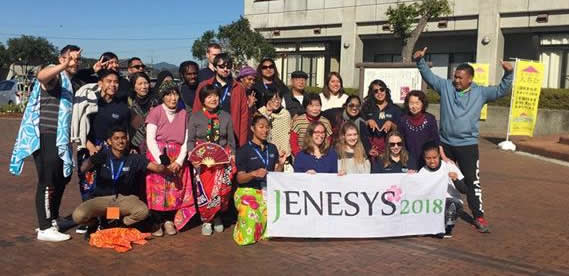
A delegation of 20 university students of New Zealand visited Japan between 18 November and 27 November 2018. Here below participant's report who went to Japan on two themes: History, Culture and Peace-building, and Sport respectively.
Veronica Adeline Walker Pot - Course Theme: History, Culture and Peace-building
Keith Hunter - Course Theme: Sport
Special Invitation Programme for Graduate Students
Ms Luke participated on Special Invitation Programme for Graduate Students at Nichibunken in Kyoto.
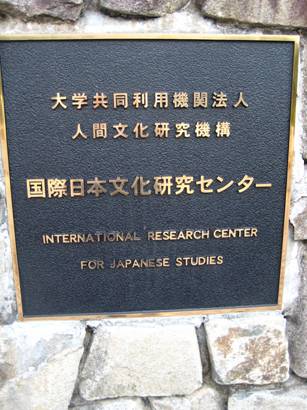
This year I have been very fortunate to be selected by the Japan Foundation to study in Japan for 5 weeks at Nichibunken (International Research Center for Japanese Studies). With the study center being located in Kyoto, I had the best of both worlds: an opportunity to use the study resources at a renowned graduate study center, and also to be living in one of the world's great cultural cities.
The research that I conducted at Nichibunken consisted mainly of looking at Singapore-Japan relations and how this has contributed to Singapore's national identity. The construction, application and sustenance of the Singaporean national identity is the main focus of my thesis. Singapore is a very young nation, and being an amalgamation of different Asian cultural values and identities, Japan too, has played a major role in the creation of the Singaporean national identity. This was what inspired me to look further into the implications of Japanese influence in Singapore. I searched relevant literature and drew comparisons with literature that I had previously found on Singaporean national identity. By looking at the Japanese perspective of involvement in Singapore's economic and social development (from literature at Nichibunken), especially since the 1960's, I was able to obtain a different angle of approach to the Singaporean national identity. I will be using the information I gathered at Nichibunken in my final thesis, and know that it will add immense value and relevance to my main topic of the Singaporean national identity.
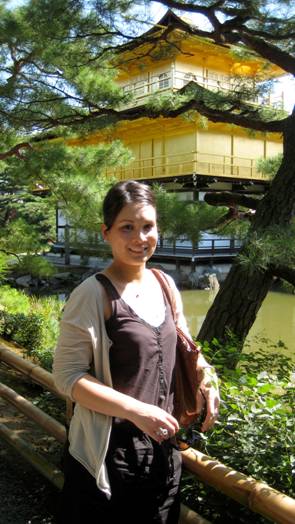
Aside from researching literature at the well-stocked library in Nichibunken, I was also able to take time out to explore Kyoto's amazing sights and sounds. While I have travelled around Asia quite a bit, I have never been to one city where there were so many incredible historical sites in one place, and the most interesting blends of old and new. While I can't speak Japanese, the few phrases that I taught myself went far to help me during my time in Japan, and I always found people were ready to help, even if they spoke little English. I spent much time in the quaint streets of Higashiyama and Arayashima, and enjoyed thoroughly taking a day trip to Nara. While I spent time enjoying the pace of life in Kyoto, I was also able to travel to Hiroshima, Miyajima and Tokyo. Hiroshima in particular was a place of interest for me, as I have always wanted to visit the museum and the Children' Peace Memorial. The huge torii in the inland sea of Miyajima at sunset was simply a sight to behold, and that was when I knew I would certainly have to return to Japan sometime soon. Tokyo was a whole different world to what I was by now used to in Kyoto. The speed of life, the sea of people everywhere and the incredible vibrancy was sensational. I was amazed at the differences each part of Japan exhibited, but equally struck by how strong the Japanese culture was, even amongst the younger people.
I am truly thankful for this opportunity, and wish to thank everyone who has assisted me, particularly the Japan Foundation and Tamae at the Japanese Embassy in Wellington. I cannot wait to go back to Japan, this time to learn Japanese!
East Asia Future Leader Programme
Ms Malloch participated on East Asia Future Leader Programme “Migration and the Role of Community amid the Global Financial Crisis” from 12th to 24th May 2009
Opposite ends of the spectrum: Multiculturalism in New Zealand and Japan
When it comes to a comparison of demographic dynamics and levels of multiculturalism, New Zealand and Japan are worlds apart. New Zealand is a country that has been formed by immigration; historically this has not been the case for Japan. Japan has maintained a strongly homogenous ethnic culture until quite recently. Even now, migrants make up only 1.6 percent of the population in Japan. This percentage may seem rather small in comparison to the 25 percent of people in New Zealand who are born overseas; however, 1.6 percent of the large Japanese population accounts for over two million people. New Zealand has about one million migrants by comparison. So, how well is Japanese society absorbing these two million migrants into society? In this paper I will discuss my experience of learning about the climate of migration in Japan with reference to New Zealand, and attitudes toward migration and multiculturalism in both countries.
I am employed as a Policy Analyst in the Immigration Policy team at the Department of Labour. Specifically, my key areas of responsibility have been to lead the development of a Plan of Action to Prevent People Trafficking and to lead a policy review of the Victims of Domestic Violence immigration policy. This work experience has given me a good understanding of both the border security and humanitarian objectives of immigration policy. Through both my employment in the government sector and my ongoing university study I am continually improving my expertise in the social and economic impacts of immigration. Participating in the JENESYS Programme was a great way to increase my knowledge of migration trends and drivers in the Asian region. My participation was also an opportunity for me to share New Zealand perspectives on immigration issues and to inform my peers about the direction the New Zealand government is taking to meet the challenges and opportunities of permanent and temporary immigration.
New Zealand immigration policy recognises that immigration is essential and has economic as well as social benefits. There are three pillars to New Zealand's immigration policy:
- attracting skilled migrants to work in New Zealand
- enabling eligible family members of migrants to be reunited and settle well in New Zealand
- meeting our international obligations to refugees and to those in need of protection, as well as maintaining the relationships we have with Pacific nations with specific immigration policies.
The global economic crisis is impacting on New Zealand and introduces new challenges for immigration policy. While unemployment is increasing at the same time, some skill shortages continue to persist in both high and low skilled occupations.
It is important that immigration policies recognise the needs of the labour market. New Zealand has a programme of permanent migration which leads to citizenship after five years. Immigration policy also facilitates employer access to temporary workers. The New Zealand Government scrutinises migrants' job offers to make sure that no New Zealanders are available to do that job in that area who could potentially be missing out on a job opportunity. The New Zealand Government recognises that despite the economic crisis some skill shortages remain and so it is working to enable temporary migrants with the skills New Zealand needs to immigrate. For example there is a constant need for healthcare professionals, as there are simply not enough New Zealanders qualified for this work; therefore, we rely on migrants to fill these positions. It is important for considered government reactions to the economic crisis that do not impede employers ability to hire the staff they need, especially if no citizens or permanent residents are available to do that specific job.
The New Zealand Government encourages long-term settlement to increase the social benefits for both migrant families and host communities. The New Zealand Government also places a high priority on assisting the Office of the United Nations High Commissioner on Refugees (UNHCR) with resettling an annual quota of 750 refugees and their families each year. Refugees do not have the option to return to their home country so it is essential that they are fully accepted by their host community and are able to develop a sense of belonging.
I was encouraged to see government departments in Japan considering the issues faced by migrants at a high level. One example of this was the Cabinet Office we visited which had designed and implemented a range of policy measures to assist Nikkei peoples' who find themselves out of a job (and potentially losing their job-related accommodation at the same time) due to the current economic crisis. While their policy to assist migrants to return home was the most publicised and debated aspect of this policy in international discourse on migration, there were several other very proactive measures within the policy which aimed to assist Nikkei people's to stay and find more work. These efforts are admirable and it is good to see them being supported and enhanced.
By sharing views on the Japanese experience of migration with participants from both Japan and the wider East Asia region, I learned that there are many common pillars of understanding about the positive role migration can play in society that have yet to be realised in Japanese communities. These common pillars of understanding are that, firstly, diversity is generally a benefit to society; secondly, economic imperatives demand that migrant labour fill skills gaps and shortages; and thirdly, that in order for people to settle well they need to be fully accepted by their community. While these common pillars of understanding are widely accepted migrants are still being generally marginalised by society in most countries. For example, migrants in Japan face significant social and economic disadvantages which lead to negative settlement outcomes. This situation is most often due to the language and cultural barriers between migrants and their host communities. It is pleasing to see that language and cultural issues are being addressed by locally supported language schools for migrants' children.
I was honoured to have been given the opportunity to meet with many children of migrant workers in Japan who are learning Japanese language alongside their regular studies. Their brave efforts are inspirational. Language barriers tend to be the prominent feature of the relationship between the migrants themselves and Japanese society. Language skills can be the key to opening up opportunities for themselves and their families to succeed in Japanese society both economically through employment and socially though more active participation in community life. By assimilating through language, the next step towards greater social integration becomes more possible. In the current financial crisis the challenges migrants face in relation to achieving the level of social inclusion needed for good settlement can be more difficult to bear for many migrants who face unemployment and the subsequent risk of social exclusion. It is the responsibility for host communities to work with migrants to find positive responses to the greater social challenges, and opportunities, presented by multicultural coexistence. Schools that teach Japanese language alongside general curriculum taught in children's mother tongue are a positive step in this direction as they open up opportunities for the children to have increased economic advantage as they enter higher learning and employment, and can allow them to maintain a sense of identity based on their ethnic and cultural heritage. It also gives them the option to be integrated into a Japanese public school as their language proficiency develops.
Diplomatic relations are the key to developing plans to overcome the challenges faced by migrants. Through diplomacy governments can share ideas and experiences. For example, Japan, which is a nation only recently coming to terms with the need to accommodate a variety of migrants in order to keep the economy functioning, can engage with nations in the Asia-Pacific region who are more experienced in dealing with migration and multicultural issues. Japan can learn from the range of policy initiatives that have been both successful and unsuccessful, to figure out what policy options may be best suited for the Japanese context. This is beginning to happen. Already the Japanese government has sent a delegation to New Zealand in July 2008 to look at how the refugee quota is managed because Japan has recently committed to resettling 20 Office of the United Nations High Commissioner for Refugees (UNHCR) refugees annually. Such diplomatic efforts should be continued across the region because by learning from each others' experiences governments can fast track progress towards implementing immigration policies that result in positive social and economic outcomes for both host communities and migrants themselves.
Participants' Essays of the Japanese-Language Programme of University Students in East Asia 2009
- They participated this programme from 10th June to 22nd July 2009, studied Japanese-Language and Japanese culture at the Japan Foundation Japanese-Language Institute, Kansai with 30 students from 9 countries. Here below are three essays by Lauren, Eileen and Derikansyah among those participants.
Ms Lauren Williams (Auckland University of Technology, Auckland)
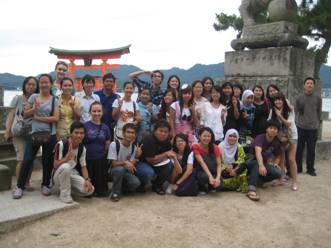
The Japan Foundation JENESYS Summer Programme was the trip of a lifetime. An all expenses paid chance to study and widen my knowledge of Japanese culture and the way of life, all while meeting amazing people and having fantastic experiences along the way.
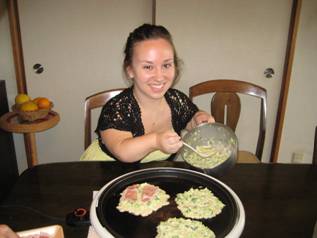
30 participants altogether from New Zealand, Australia, and various countries around Asia such as Laos, Vietnam, Cambodia, and Malaysia, took part in the programme- 6 weeks staying at the Japan Foundation Centre in Osaka.
The centre itself had everything you would need, a cafeteria, karaoke room, kitchen, gym, shop, and bicycles to borrow at all hours of the day- very handy in Japan.
From the accommodation to the research trips to Tokyo, Kyoto and Hiroshima, everything was organised for us.
During the week we would attend classes, which included discussions, interviews, speeches and presentations.
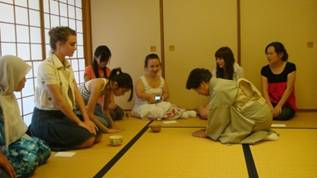
Each class we were given the chance to learn about the countries each participant came from, and of course about Japan. The discussions ranged from education to marriage, and each class was about building our fluency in conversation.
The classes were small, so this gave us ample opportunity to really spend time with the teacher, and consult on a regular basis about what our goals were within the course, and useful methods for developing our Japanese. We also got the chance to take part in various cultural activities. Including a home visit with a volunteer Japanese family. Families that were involved with the Japan Foundation took us in for the day, and we were able to experience what Japanese life is really like. I spent the day with my host family making Okonomiyaki (a traditional food in Osaka) and Sushi, while conversing about New Zealand, Japan, and similar interests.
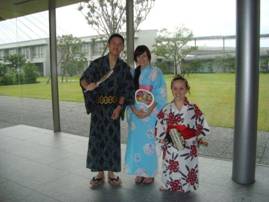
There were various other cultural activities we took part in at the centre also. Such as Yukata wearing, Wadaiko (Japanese Drums), and the traditional Sadou Tea Ceremony. All of which were very interesting, and fun. The people that came to teach us about these various practices were all very knowledgable and we all felt very comfortable about asking any questions we had.
I really enjoyed every aspect of this programme, and would definitely recommend it to anyone who is studying Japanese. I have learnt a lot from my experiences in Japan, and will continue to develop the skills I have learnt from this programme. I have met some great people, from all different walks of life; from the other participants in the programme, to the members of the community and the very helpful and supportive teachers who have great understanding of individual needs. I believe this is a unique stepping stone towards my future, and I am very grateful for the chance to have taken part in this programme.
Ms Eileen D'urban Burgess (Auckland University of Technology, Auckland)

My name is Eileen D'urban Burgess and I have just arrived back to New Zealand after going on the 2009 JENESYS Programme at the Kansai International Centre in Osaka, Japan. Firstly I would like to talk about some of the things that were offered on this programme
Accommodation and food
The accommodation we were provided was definitely more than I expected. We were given our own single rooms, complete with a bathroom, huge desk, television and much more. Having my own space made settling into the new environment incredibly easy. The food that was available at the cafeteria was also beyond what I was expecting. The luxury of the accommodation and food is definitely something I am missing now!
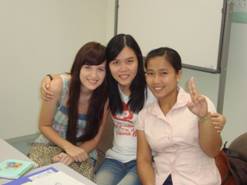
I have to say, the classes took a little getting used to. Most days they started at 9am and some days didn't finish until 5pm. However, they were not overly difficult as we were placed in classes with people of a similar ability as our own. We had discussion, interview and the occasional optional class, all I felt were extremely beneficial to my Japanese.
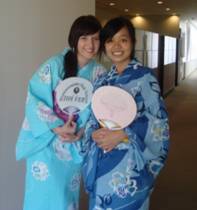
One of the best and most enjoyable aspects of classes in the JENESYS programme would have to be the “culture experience” classes . My personal favourite would have to be the yukata class! It was so much fun being able to dress up and learn (and experience) the complex procedure involved in wearing the Japanese yukata.
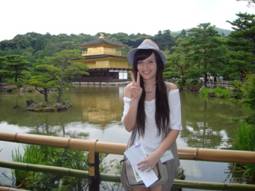
During the programme we travelled to Tokyo, Kyoto and Hiroshima. It was interesting to experience the difference in life styles between these places. For example, in Osaka, Kansai dialect (Kansai ben) is widely used, whereas although it is known in other places because it is really famous in Japan you don't often hear it used. My personal favourite was Tokyo as it was so different to what I am used to in New Zealand. However I also really enjoyed the experience of staying in a traditional Japanese inn in Hiroshima, as it was like nothing I've ever experienced before. Kyoto was also a really beautiful place.
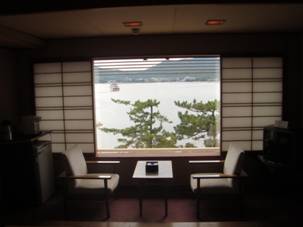
Overall, I can honestly say this trip was the best opportunity I've had and I am really grateful that I was able to take part in such a well thought out and amazing programme. Not only do I feel my Japanese has improved, but my love for Japan has grown immensely. I can't wait to get back to Japan!
Mr Derikansyah Salim (University of Canterbury, Christchurch)
The JENESYS Program
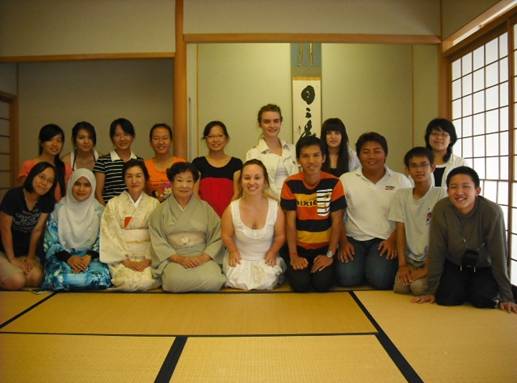
I participated in the JENESYS program for Japanese language students from 10th June 2009 - 22nd July 2009. This program is funded by the Japan Foundation, an organization specializing in international student exchange in Japan. Students in Southeast Asia who do Japanese studies are given the opportunity to visit Japan by participating in this program. The objective set is to deepen your understanding of the Japanese society, culture as well as the language. For those aiming to be Japanese language teacher, establishing a business relationship with Japan or even just curious about how does living in Japan feel then this is the program for you. The six weeks you are in Japan will be unforgettable I am telling you. Strict and intensive are the best way to describe the experience I have through participating in this program. But worry not because the reward is well worth the sweats.
Sometimes I think that living at the Kansai Japanese language institute is even better than staying at home. Each participant is given their own room complete with everything a student need. This includes bed, bathroom and furniture. Free broadband internet and air-conditioner are also included. On top of that, there are all sort of recreation facilities such as a gym, kitchen, karaoke room, tennis court and many more. People from all sort of countries live together in the same building making it easier to socialize and make friends. Breakfast, lunch and dinner are all provided by the institute. You can focus and make the most out of your study for the next six weeks you will be staying at the institute.
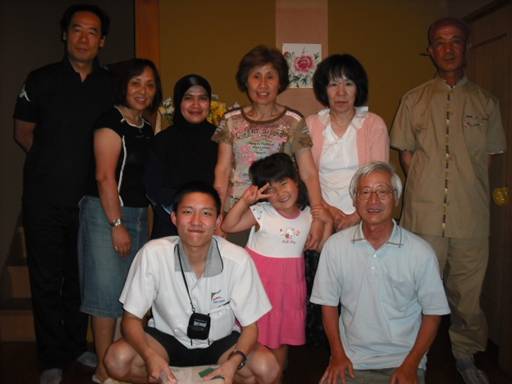
The lessons are excellent. All the necessary skills associated with using the Japanese language are covered. This includes interview, presentation, discussion and revision classes. The teachers make the lessons simple to understand and yet challenging to carry out at the same time. You will have more than enough opportunities to receive the teachers help within and outside of class hours. I can assure you there are endless amount of things you can do while you are staying in Japan. Don't forget the essential study buddy of all students. The library provides all the extra readings ranging from older to the most recent materials. The staffs are kind and very resourceful. Rest assured securities are well maintained with guards around ready for action.
Most exciting of all are the trips and cultural activities. Participants will receive the opportunity to visit infamous cities of Japan such as Tokyo, Kyoto and Hiroshima. There will be sufficient but moderate amount of time to visit some of Japan's attractions like Kabuki, Shinto shrine and Buddhist temples. The abundant variety of exquisite dish such as sushi, okonomiyaki and yakiniku are available when your stomach needs refueling.
There are too many things to try out in a six weeks long program. Nevertheless, you will be able to patch up the big curiosity hole on your chest. Whether the nature of your curiosity is of Japan's society, culture or the language itself. Through participating in this program you are very likely to quench your lingering thoughts. Well I have so can you I believe.
Japan Information & Cultural Centre
- Centre Functions
- Events
- Subscribe Event News

- JET Programme (Work in Japan)
- MEXT Scholarships
People Exchanges
Language Education & Cultural Support
Japan - New Zealand Relations
